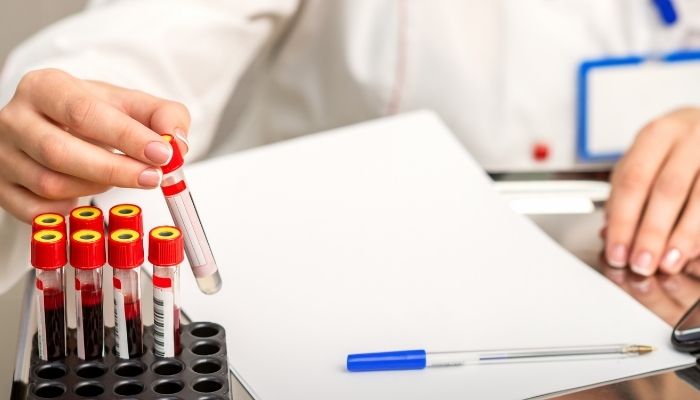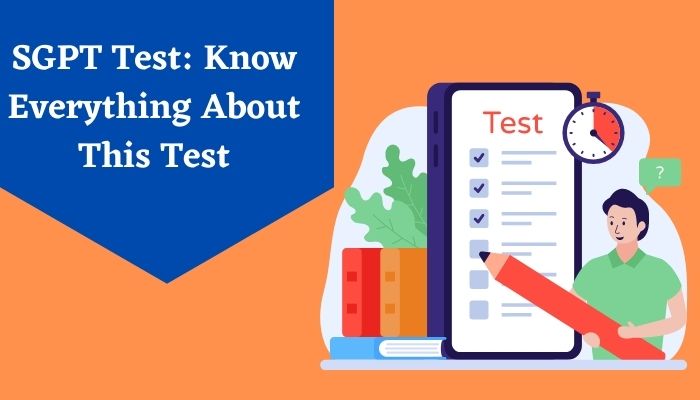SGPT test means Serum Glutamic Pyruvic Transaminase which measures how healthy your liver is. This test shows the level of Glutamate Pyruvate Transaminase (GPT) in blood serum.
GPT is an enzyme that is commonly present in heart cells, kidneys, muscles, and the liver. SGPT is also called ALT (alanine aminotransferase) that your doctor recommends finding out a liver disease or liver injury due to any drugs.

What is SGPT Test?
The cost of an SGPT test can range from INR 150 to INR 400 or more depending on various factors. It is important to note that the price may differ depending on your geographical location.Please check the price of the SGPT test in Delhi/NCR, your nearby centers and other details.
SGPT Test Summary
| Also known as | SGPT blood Test, SGPT ALT Test, or SGPT Live Test |
| Test Type | Blood |
| SGPT test includes | To determine the capability of your liver |
| Preparation | No special preparation is required |
| Reporting | Within 24 hrs |
| Test price | The cost of an SGPT test is Rs. 150-Rs.400. he price may also depend on where you are based. |
| Also included in | Health Insurance Plans |
| Related tests | Complete blood count, SGOT, Ultrasound, glucose test, bilirubin test, albumin, total protein |
Why is the SGPT or ALT Test Important?
This enzyme is commonly present in your liver. This enzyme may also be found in your kidneys and other organs, in smaller amounts. To break down food into energy, your body needs ALT.Usually; the concentration of ALT in blood is low. If your liver is injured or damaged, then more ALT will be released in your blood and levels will elevate. Your doctor may prescribe this test along with other liver tests.
Why Would My Doctor Order SGPT Test?
Your doctor will suggest this test if you are experiencing various symptoms of liver disease or damage. These symptoms could be any of the following:- Stomach pain or swelling
- Nausea
- Vomiting
- Yellow skin or eyes (called jaundice)
- Weakness
- Extreme fatigue
- Dark-colored urine
- Light-colored stool
- Skin itching
- If you contact with the hepatitis virus
- Excessive consumption of alcohol
- Have a family history of liver disease
- You are taking medications that can cause liver damage
Preparation Before the SGPT Test
You don’t need any special preparation to perform this test. Your doctor might advise you not to eat or drink anything for up to 8–12 hours before the test. You can book an appointment for blood sample collection early in the morning for convenience. It is important to inform your doctor before the test if you are taking any medications or supplements as they may hamper the results of the test. Since this is a blood test, you must wear comfortable clothes that allow easy access to the fold of your elbow for drawing out blood; a t-shirt or short-sleeved upper-wear is usually recommended. In case a child is getting the SGPT test, the parents are advised to bring along a toy or a book to distract them.During the SGPT Test Procedure
The procedure for an SGPT test is quite simple; the patient only needs to sit still for a few minutes to give a blood sample, and they are free to go about their day. Listed below are the things that usually take place during the SGPT liver test:- You need to visit a lab or diagnostic centre to perform this test.
- An experienced nurse or lab technician will collect your sample, mainly from the vein of your upper hand.
- After tying a band around the upper part of your arm, the technician will identify the vein from which he will collect the blood sample.
- He will clean the area by using an antiseptic and insert a needle into your vein.
- Your blood will be deposited into a vial or tube.
- Once the sample is collected, the technician will remove the band as well as the needle.
- He will place a bandage or gauze at the site to stop the bleeding.
- Your blood sample is either stored as per the standard guidelines or sent for examination.
SGPT Test Results
You will likely get your test results within a few hours or on the same day. SGPT Test normal range can be between 7 to 55 units per litre (U/L). Men may have higher levels of ALT than women.Slightly High ALT Levels May Be Caused By any of the following conditions:
- Alcohol abuse
- Cirrhosis (chronic liver disease which leads to fibrosis and nodularity).
- Mononucleosis
- Examples of these drugs are aspirin, statins, or sleep-inducing drugs.
Moderately High ALT Levels May Be Because Of any of the following conditions:
- Chronic liver disease
- Alcohol abuse
- Cirrhosis
- Blockage of the bile ducts
- Heart attack or blockage (if your heart can’t pump enough blood to your body)
- Kidney damage
- Muscle injury
- Damage to red blood cells
- Heart stroke
- Too much vitamin A
Very High ALT Levels Can Be Caused By any of the following conditions:
- Acute viral hepatitis
- Overuse of drugs like acetaminophen (Tylenol)
- Liver cancer
- Sepsis
- Blood Test: Alanine Aminotransferase (ALT, or SGPT). Nemours KidsHealth[Internet]. https://kidshealth.org/en/parents/test-alt.html .Accessed April. 2, 2022.
- Alanine Aminotransferase (ALT) Test: What Does It Mean?. WebMD[Internet]. https://www.webmd.com/digestive-disorders/alanine-aminotransferase-test .Accessed April. 3, 2022.
- ALT Blood Test: MedlinePlus[Internet]. https://medlineplus.gov/lab-tests/alt-blood-test/ .Accessed April. 3, 2022.
- ALT Blood Test: University of Rochester[Internet]. https://www.urmc.rochester.edu/encyclopedia/content.aspx?contenttypeid=167&contentid=alt_sgpt .Accessed April. 3, 2022.
